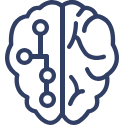There are still many unanswered questions about learning and attention challenges.
Current Projects

Measuring Self-Determination
We are measuring our students’ self-determination through use of a tool developed by the American Institutes for Research. Our data demonstrate the reliability of this tool over time and its usefulness in measuring self-determination of students who face learning and attention challenges.

Observing Teacher Instruction
In concert with the Idaho Department of Education, we observe and evaluate delivery of comprehensive decoding instruction using the research-based RESET rubric developed by a team at Lee Pesky Learning Center and Boise State University. As part of this project, we also provide professional development to reading coaches from various school districts.

Every Child Ready to Learn
The Every Child Ready to Learn project seeks to improve early literacy outcomes for children in preschool through third grade. Working in seven districts in Idaho, we are providing professional development and training to teachers to build their capacity to implement evidence-based reading instruction in the classroom.

Early ID Project
Project Early ID is focused on creating a set of early detection tools to reliably identify children at-risk for learning and attention challenges. Our current focus is on developing an online, non-language based phonological processing screening tool.
University and Research Partnerships
Lee Pesky Learning Center’s research agenda is supported by our unique partnerships with Colleges of Education at Boise State University, the College of Idaho, Northwest Nazarene University, and the Oregon Research Institute. By partnering with leading researchers, providing opportunities for graduate students, and creating internship opportunities for teacher candidates, we are working together to create pathways to learning.


